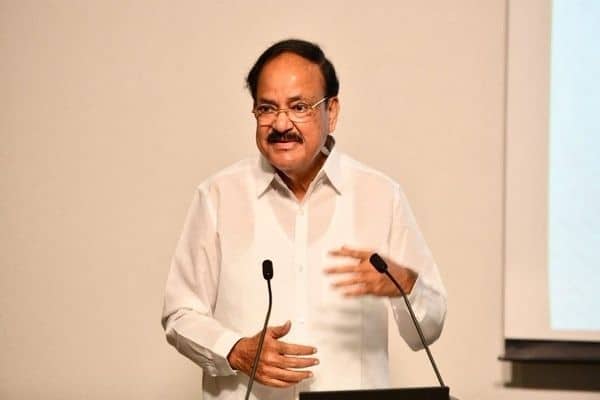
The universities need to become thought leaders in finding solutions to global challenges such as climate change, poverty and pollution, said the Vice President of India, M. Venkaiah Naidu during his address at the ‘World Universities Summit’ organized by O.P. Jindal Global University virtually today.
He also wanted the universities to discuss various socio-economic and political issues facing the world and come up with ideas that can be implemented by the governments as per their needs and suitability.
Referring to the benefits of learning in the mother tongue, the Vice President said it enhances one’s grasping and comprehension levels. “To understand a subject in another language, one has to first learn and master that language, which needs a lot of effort. However, this is not the case while learning in one’s mother tongue,” he added.
Highlighting our country’s rich linguistic and cultural heritage, the Vice President said that India is home to hundreds of languages and thousands of dialects. He said, “Our linguistic diversity is one of the cornerstones of our rich cultural heritage.” Emphasizing on the significance of mother language, Shri Naidu said, “Our mother language or our native language is very special to us, as we share an umbilical cord relationship with it.”
Union Education and Skill Development Minister Shri Dharmendra Pradhan also addressed the summit. Pradhan emphasized on the Government’s commitment to transform India’s education sector bringing it at par with global standards, encouraging research and innovation and on developing well-rounded responsible citizens, who are also global citizens- Vishwa Manav.
The education minister added that the New National Education Policy -2020 has heralded a new imagination for the Indian higher education system. It outlines the vision of the Prime Minister Shri Narendra Modi to make an Aatmanirbhar Bharat. Quality, equity, accessibility and affordability are the four pillars of the new education policy on which a new India will emerge, he added.
He said that the multidisciplinary education and research university (MERU) will open up new opportunities for India’s youth. MERU will promote inter-disciplinary research and make India a global hub of Research and Development.
Pradhan stressed that synergizing education with skill development will open new avenues of socio-economic empowerment. The NEP will facilitate integration of education with skills and enable India to reap the demographic dividend.
The Covid-19 pandemic necessitated the adoption of online learning and use of digital technologies to ensure that learning continues. This mode is going to stay giving way to hybrid methods of learning and knowledge dissemination. Our future planning, therefore, needs to fill a digital divide, the education minister added.



















